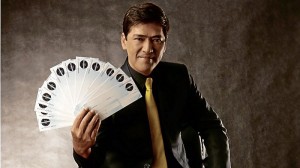Most newcomers who try to make it in show biz each season fiercely believe in their subjective heart of hearts that they’re beautiful or handsome enough to make it big as dreamy romantic-dramatic leads. That’s why the local acting trade is so overcrowded, positively crawling with the self-styled Anne Curtises and John Lloyd Cruzes of tomorrow.
Starlets should really be more creative and stop banging their heads against that immovable “serious leading man or lady” door, and try to make it instead—as goodlooking comedy stars!
Why should the plug-ugly ones have all the fun—and the resulting moolah? The defining quote in the show biz trade is, “Funny is money,” and all less than gloriously lovely or hunky newbies should eagerly take note of it.
On the local scene, it’s a no-brainer to say that the funny and sunny likes of Vic Sotto, Joey de Leon, Ogie Alcasid, Michael V and other popular comedians out there are making more money than 95 percent of the rest of the hankering, hungering show biz population. Their international counterparts, paced by Steve Carell, Vince Vaughn, Sacha Baron Cohen and Will Smith, aren’t doing all that badly, either. Neither, for that matter, are star comediennes like Bette Midler, Betty White and Whoopi Goldberg.
While being funny-looking is still money in the bank in the global comedy trade, it’s no longer an essential requirement, as in the predictably stereotypical days of Pugo-Tugo, Chichay, Aruray, Menggay, Casmot, Dely Atay-atayan, Babalu, Babalina, and their weirdly cartoony ilk.
Even in the olden days, lovely comedy and comedy-romance stars like Kay Kendall and goodlooking gents like Tony Curtis and Cary Grant gave funny movies a tickle or two. And, these days, Jack Black, Zach Galiafianakis, Ben Stiller and Adam Sandler are hitting the jackpot by puckishly aiming at the profitably sweet spot that is the global TV-film audience’s collective funnybone.
What do new talents need to make it as comedians? An antic view of life and the pratfalls we take from day to day (we never learn, do we?). The ability to ad-lib and figure out the viewer’s kiliti. A natural knack for setting up and delivering punchlines. Great empathetic powers of observation.
The readiness to laugh at yourself first before zeroing in on others. Knowing the difference between comedy and satire, and between satire and farce. Working with all sorts of audiences, and eliciting laughter anytime, anywhere. Being able to generate loud and hearty laughs without resorting to demeaning slapstick, the comedy of insult, and gross-out humor.
Yes, the requirements are many, but so are the rewards especially if you can carry a tune aside from zapping your audience with one joke after another.
Look at Ogie A. and Michael V—they’re multimedia stars who work ‘round the clock in all sorts of moods and modes—and the fact that they aren’t great lookers isn’t a liability—it’s an absolute relevance!



